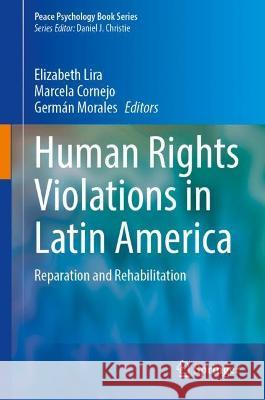Human Rights Violations in Latin America: Reparation and Rehabilitation » książka



Human Rights Violations in Latin America: Reparation and Rehabilitation
ISBN-13: 9783030975418 / Angielski / Twarda / 2022
Human Rights Violations in Latin America: Reparation and Rehabilitation
ISBN-13: 9783030975418 / Angielski / Twarda / 2022
(netto: 614,84 VAT: 5%)
Najniższa cena z 30 dni: 578,30
ok. 16-18 dni roboczych.
Darmowa dostawa!
- understanding the relationship between mental health and human rights
- understanding ethical and professional dimensions
- a broadened knowledge of working with victims
SECTION I – HISTORY, CONCEPTS, AND APPROACHES
Elizabeth Lira: Psychologist (Universidad Católica de Chile, 1971), MSc. in Development Sciences (1977); Post graduate degree in Family Therapy (1989). She worked as clinical psychologist with victims of human rights violations after 1978 in Chile. She received the National Psychology Award “Colegio de Psicólogos”, Chile, 1983; she was awarded in 1991 with the “Sergio Yulis” prize of the Chilean Society of Clinical Psychology;the International Humanitarian Award American Psychological Association in 2002 and the National Prize of Humanities and Social Sciences 2017 in Chile. She was member of the Political Prison and Torture Commission of the Government of Chile: 2003-2005 and 2010-2011. She has published several books and articles on human rights, reparation policies, reconciliation, and memory. Her last book published in 2020 with Brian Loveman (SDSU) is Poder Judicial y Conflictos Políticos. Chile 1973-1990. [Judicial Power and Political Conflicts. Chile 1973-1990]. She has been Dean of the Faculty of Psychology (2014-2022) at the Alberto Hurtado University in Santiago and currently co-researcher in the project “Beyond the victim paradigm: Genealogies of subject performance devices of political violence. Chile, 1973-2018” (Fondecyt N°1190834) in the Interdisciplinary Program in Memory and Human Rights at the same university.
Marcela Cornejo: Psychologist (Universidad Católica de Chile, 1995) and PhD in Psychological Sciences (Université de Louvain, Belgium, 2004). She is the current Chair of the Department of Psychology at the Pontificia Universidad Católica de Chile. She is an associate researcher at the Millennium Institute for Research on Violence and Democracy, VIODEMOS [ANID - Millennium Science Initiative Program - ICS2019_025], and an adjunct researcher at the Center for the Study of Conflict and Social Cohesion, COES [CONICYT/FONDAP/15130009]. She has devoted over 20 years to the study of topics associated with psychosocial traumas due to political violence; individual and collective working-through processes produced by political violence; processes of biographical construction and collective memory; generational aspects in the comprehension of psychosocial phenomena; and the rationales and practices of qualitative social research. In these topics, she has conducted research projects in collaboration with Chilean and foreign researchers, participating in and organizing conferences and symposiums, publishing papers in several journals, chapters in books, and supervising doctoral theses in Chilean and foreign universities.
Germán MORALES: Clinical Psychologist and MSc in Clinical Psychology, Universidad Católica de Chile. Postgraduate degree in Family Therapy, Instituto Chileno de Terapia Familiar. He has worked as a psychotherapist in several institutions that serve low-income areas and victims of human rights violations such as the clinical team of the Latin American Institute of Mental Health and Human Rights (ILAS), which received the Chilean National Psychology award (2003). He has taught at several universities and, since 2001, he has been a Professor of the Department of Psychology at the Universidad Católica de Chile. In addition, he belongs to several organizations, including the Chilean Association of Group Psychoanalytic Psychotherapy, the Child Systemic Relational Network, and the Chilean Chapter of the International Association of Psychotherapy and Relational Psychoanalysis (IARPP-Chile). He has authored several publications on trauma, adolescence, self-care, and professional burnout.
A timely contribution to the study of peace psychology in Latin America, this volume describes clinical, psychosocial, and community interventions with victims from Mexico to Chile from the 1970s onward. Chapters analyze how to conceptualize complex processes such as the appropriation of children and political repression, raising psychological, juridical, and political implications for the victims, their families, human rights organizations, and society. Also included are studies and analyses of political processes in countries currently undergoing crises such as Venezuela and Colombia and the challenges posed by the peace process from a political psychology perspective. All authors present the results of studies or clinical cases illustrating creative methodologies and practices in different contexts.
- understanding the relationship between mental health and human rights
- understanding ethical and professional dimensions
- a broadened knowledge of working with victims
1997-2026 DolnySlask.com Agencja Internetowa
KrainaKsiazek.PL - Księgarnia Internetowa









